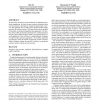Free Online Productivity Tools
i2Speak
i2Symbol
i2OCR
iTex2Img
iWeb2Print
iWeb2Shot
i2Type
iPdf2Split
iPdf2Merge
i2Bopomofo
i2Arabic
i2Style
i2Image
i2PDF
iLatex2Rtf
Sci2ools
101
click to vote
ATAL
2003
Springer
2003
Springer
Detecting deception in reputation management
We previously developed a social mechanism for distributed reputation management, in which an agent combines testimonies from several witnesses to determine its ratings of another agent. However, that approach does not fully protect against spurious ratings generated by malicious agents. This paper focuses on the problem of deception in testimony propagation and aggregation. We introduce some models of deception and study how to efficiently detect deceptive agents following those models. Our approach involves a novel application of the well-known weighted majority technique to belief function and their aggregation. We describe simulation experiments to study the number of apparently accurate witnesses found in different settings, the number of witnesses on prediction accuracy, and the evolution of trust networks. Keywords deception, trust networks, reputation, belief functions, weighted majority algorithm
Related Content
| Added | 06 Jul 2010 |
| Updated | 06 Jul 2010 |
| Type | Conference |
| Year | 2003 |
| Where | ATAL |
| Authors | Bin Yu, Munindar P. Singh |
Comments (0)

